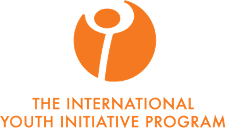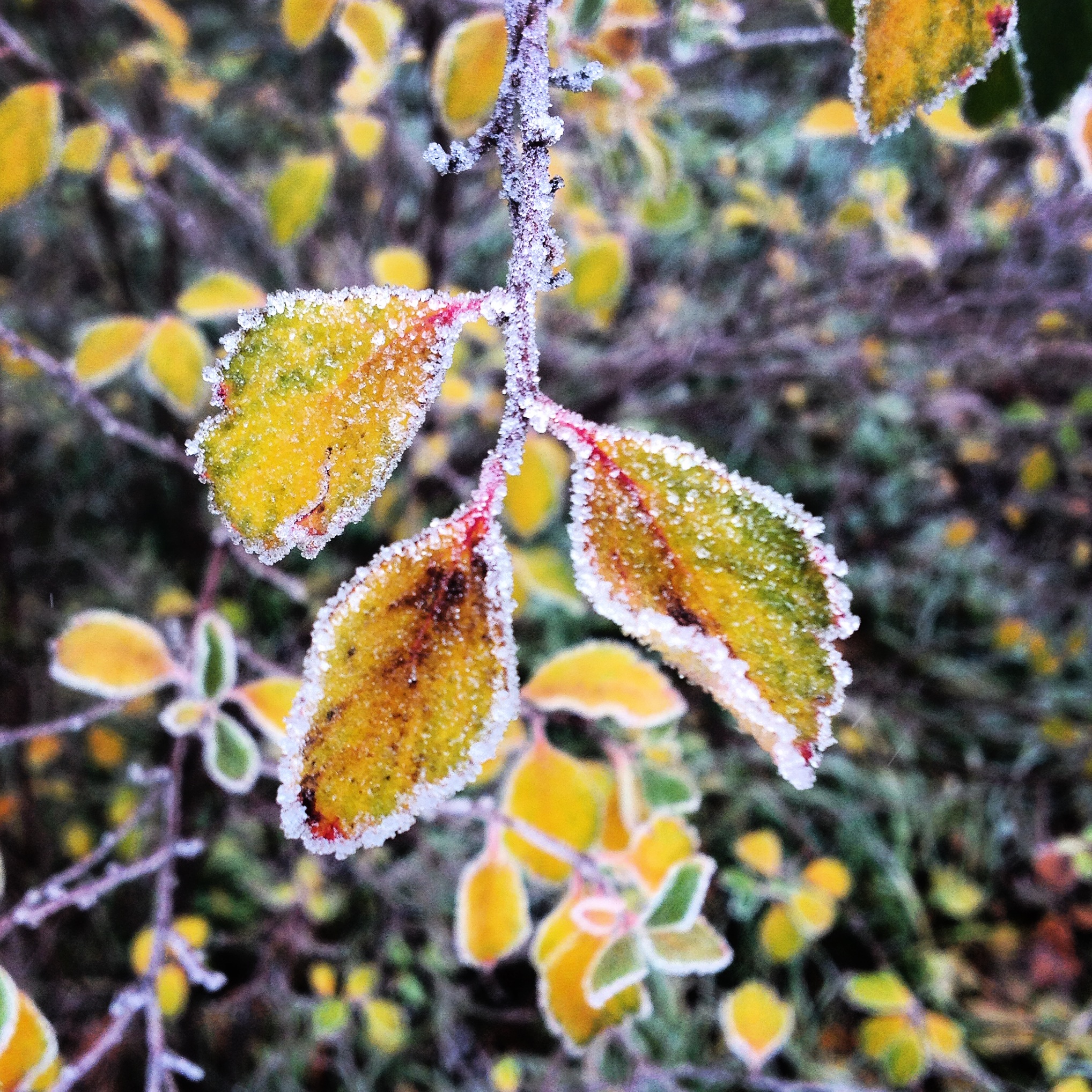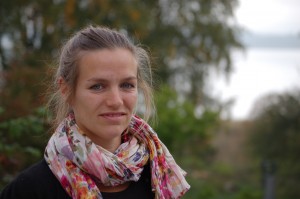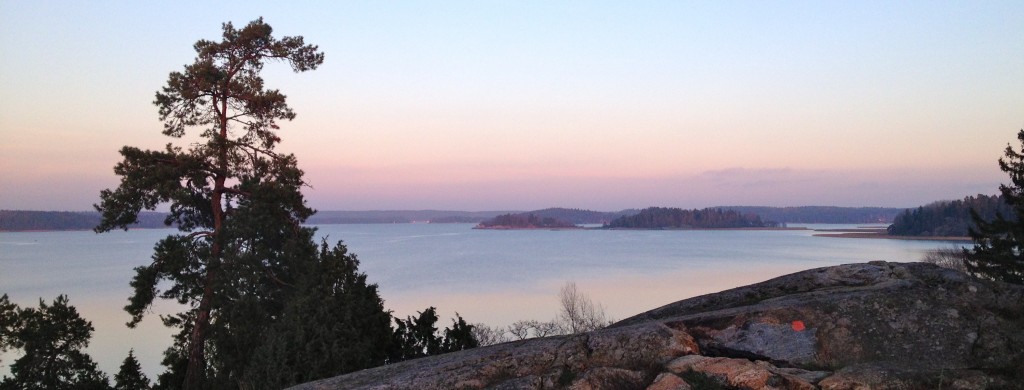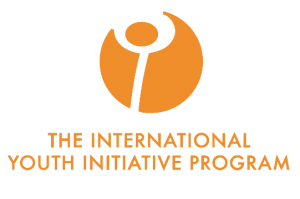It is 2:54 in the afternoon and the sun has set in Yärnaterja. The few sunrays that poked through the thick cotton clouds in the morning have been swallowed up by the day and a thick grey blanket has taken their place. This is much the same routine as yesterday, the day before and many of the days before that: a glisten of sun turns to slate colored sky, until the silhouetted branches slowly merge with their backdrop and all is dark.
But our disappearing star is not all that is happening here in this mystical place. Despite the darkening skies, there are sources of light issuing still from the hearts and minds of those gathered and engaged. These flames tumble and swell, grappling with one another’s resolve and fantastic character, forming friendships and challenging will. And other lights, too, arrive here from places far and wide, bringing with them chances to explore the phenomenal. From vulnerability to theories of complexity, from the investigation of collective wisdom to attempts at harvesting the lessons of economic exchange, though the darkness abounds, these flames are still burning strong.
Interview with a First-Time YIP Contributor:
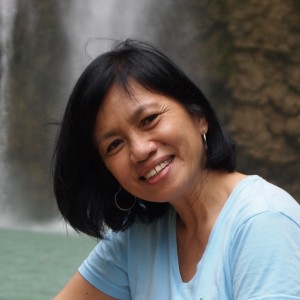
Name: Teresa D. Ruelas, aka “Tressa”
Where is Home: Currently, Cebu, Philippines
What is your work in a word: Collective-Birthing (will this count as one word? It’s hyphenated!)
What stands out from your experience at YIP?
Lots… Meeting daily, soul-to-soul, in sacred space to evolve and birth the New together. Even the Universe came to play.
What surprised you most about the participants?
Their brilliance, openhearted sincerity and authenticity; so raw in their emerging truthfulness; so beautiful. I was also surprised by their IMP-ishness (meaning In-the-Moment Present, as defined by my circle elder Anne). I love being around this quality, as it is a key ingredient to genuine Creativity and among the most valuable elements in a changing world.
Is there anything that you gained from your experience at YIP that you’ve brought back to your work in the Philippines?
Yes. A renewed love for the presence of the youth in all our co-creative endeavors in service of the greater good. Also, sharper listening and sensing and a more grateful heart to the incessant, unstoppable, collective birthing process we are all a part of.
Do you think you could find some 18-28 year olds in the Philippines who want to attend YIP
Yes. If they can be financially helped to make the trip, there will be many who will want to attend YIP.
In three free lines, what would you like to tell your readers?
They say the next Buddha will be a group, and I believe this with all my heart. You, dear reader, are part of this group. Let’s find our way to be the Buddha we were born to be for this world.
Where Does YIP’s Food Come From?
An Article on Matbygget, Ytterjärna’s Newest Restaurant
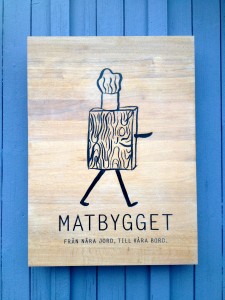
The idea for the restaurant had been growing over the years, based on observations of the copious waste that restaurants in general create and a lacking connection to the food itself, as well as an impulse support and nourish the local community.
There is no denying that food has played a fundamental role in human evolution and one could argue that it is the backbone of any healthy community. So, where is the need? Is it necessary to ship lettuce halfway across the world so that Swedes can eat salad in the middle of winter? The unanimous answer in this kitchen is, No.
The name Matbygget literally translates to “Food-Building”. Similarly to building in the English language, bygget, in Swedish, can be used as a Noun or a Verb. The double meaning was completely intended: to foster strength within a community using food, one could say, is Matbygget, or building with food. In the words of the Matbygget staff, it’s about relationship, shaking hands with the farmers who grow the vegetables and supporting them to continue their work.
“I think people should know where their food comes from,” said Simone, one of the co-workers. And isn’t it strange that often we don’t? In this day and age, it is not uncommon to have a breakfast plate with eggs from Germany, paprika from Holland, tomatoes from Spain, avocados from Chile and a cup of coffee from Etheopia. These folks are changing that, at least in Järna.
If the big question is, ‘Why sustainable, local and organic?’ than the big answer from Matbygget is, ‘To create a better world.’ “We’ve got to look at ourselves to make things happen,” said Johan, “start local.”
YIP fits happily into this cycle, lowering Matbygget’s food waste to next to nothing while simultaneously enjoying locally sourced, organic and biodynamic meals prepared by extremely talented Chefs.
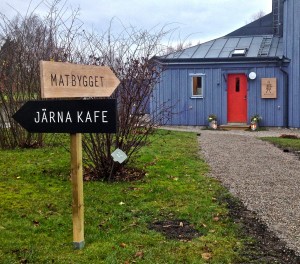
When asked about the future, the conversation turned imaginative yet grounded and every answer included some aspect of education. With its ample farms and initiatives, basing an education on everything involved in the food cycle, from growing to harvesting, cooking, preserving and fermenting, Järna is surely ripe with knowledge.
“We’re far from perfect,” said Johan, “we still buy black pepper [from Sri Lanka] and rice [from China], and we are always developing.” In fact, while I was sitting there, one of the owners came in with the good news that they had finally been granted a license to sell liquor.
“When you eat here, you feel good,” concluded Frederick, an apprentice and aspiring Chef, “the food even tastes local!” With an open challenge to come up with three cocktail recipes from 100% locally sourced ingredients, I imagined that sitting in front of the fireplace in midwinter sipping on one of them would feel good, too.
Reflections from a YIP Participant:
A General Appeal for Independence of Thought
An Essay by “King” Wittman
Gandhi is often misquoted as having said, “We must be the change we wish to see in the world.” Popular though this statement has become on the car bumpers of the masses, it is almost certainly erroneous, having behind it no known evidence of ever being written or spoken by the man to whom it is accredited. In fact, Tushar Gandhi, the great-grandson of Mahatma, is himself a strong advocate for the clearing of his famous ancestor’s name from a lengthy list of misleadingly condensed statements and downright sham quotations.
It is ironic that this statement, so proudly displayed by proponents for social change, is in fact self-fulfilling. The admirers of Mahatma Gandhi have essentially manifested the change they wished to see in the content of their hero’s message; a troublesome act, as it lends a social context to the work and philosophy of a man who many people with a “Be the change…” sticker may not actually agree with. It is a lucky thing, indeed, that Gandhi believed so passionately in non-violence during his political career, as many of his views, so candidly expressed, espoused justification of the caste system, acceptance of racial superiority, and, debatably, encouragement of Asian conquest over the West. In 1932, Gandhi even went so far as to undergo a hunger-strike in protest of granting Untouchables the right to an electoral vote in India. It is no minor occurrence that toward the end of his life, Gandhi expressed a revision of his view of the caste system to one seeing it as an unjust institution after extensive debate with and ultimate concession to his contemporary, Bhimrao Ambedkar, an Untouchable caste-born barrister and activist. To his credit, Gandhi even suggested that his own writings should perhaps be cremated along with his body after death, in order to avoid the unwarranted spread of his misguided ideas on social equality in India.
By the grace of logic, it is often so that the principle which is most defective in human activity or thinking, reveals the solution to itself in its aberration from the core values of the individual playing host to it. In the end, it is irrelevant if Gandhi is behind this statement or not, (and he most likely is not). Too often, we hand the authority to decipher what is true and righteous, as we see those qualities to be, out of the thorny wilderness of ideas, away from ourselves. If one has seen contradiction and inconsistency in the trajectory of one’s own life, then one should not be surprised to observe these aspects in the lives of one’s heroes. And, on the other hand, it is not unlikely that an anonymously furnished statement of the notorious Adolf Hitler or the legendary murderer, Christopher Columbus on subject matter other than the practical justification of slaughter might strike a chord of agreement in the minds of the most vehement despisers of these figures’ memories and acts. And why should it not be so? Are not all people verified in their capacity for complexity of thought and endlessly multi-faceted in their perceptions, judgments, and actions?
In closing, it may be pertinent to visit upon an authentic quote of Gandhi’s printed in the Indian Opinion newspaper during September of 1913:
“We but mirror the world. All the tendencies present in the outer world are to be found in the world of our body. If we could change ourselves, the tendencies in the world would also change. As a man changes his own nature, so does the attitude of the world change towards him. This is the divine mystery supreme. A wonderful thing it is and the source of our happiness. We need not wait to see what others do.”
We need not wait to see what others do…or say. The power to grant legitimacy to an idea must, by necessity, exist in a person already before that person can grant such power to another. By leaning on the legacy of another mind in order to validate an idea, we rob ourselves of the permission to legitimately conceive of the change we wish to see in the world. A person who uses the existence of so-called “independent thinkers” to justify independent thinking of her own has not yet understood the lesson of independent thought.
From Complexity Theory to Food Revolution:
Reflections on a week at YIP by Eduardo “Shima” Shimahara
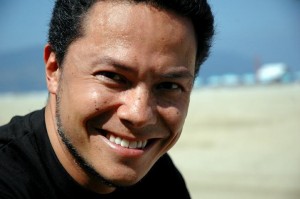
A friend of mine from Holland was travelling through Sweden and thereafter she came to Brazil. She told me she had found a very special place where brilliant youngsters live together for a whole year, have contact with very passionate “teachers” and have to come up with a yearlong Personal Project that was all about “doing something”. And there was more: she told me about how amazing those youngsters were, almost like super heroes and how special the whole campus was. At that time, I still remember that the recipe looked very simple and very special. Bright youngsters living together, having contact with amazing and inspiring “teachers” and then working on a personal project could be a fantastic “alternative”.
Then, two years ago, me and three other Brazilians came up with a crazy dream: to travel around the world visiting educational places that we used to hear about in lectures, talking to friends or even watching TED Talks on the internet. The list of places to visit was immense, with more than 100 that were somehow very inspiring to us. Like The Green School in Bali/Indonesia, or the Public School called Quest to Learn in New York, or even Cieja Campo Limpo in Brazil. Among them, the name Youth Initiative Program appeared as one of the top places, since many people were talking about that magical “world” in Järna, Sweden. We raised almost $30,000.00 USD in a CrowdFunding campaign and Andre Gravatá came all the way from Sao Paulo, Brazil, to Sweden to visit YIP.
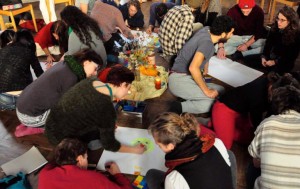
Three months ago I was preparing myself to go to Western Nepal to fulfill a module in my Masters Program when suddenly an email from one of the YIP founders popped in my inbox. Reinoud Meijer was inviting me to come to YIP, and this time, as a contributor. It was a dream come true. In order to prepare for this task, I talked to a few people who’ve been YIP Contributors. One of them – Edgard Gouveia Jr. – said: “go for it, dive deep and bring the best in you, this group is just amazing!” Well, that was challenging. What could I offer to some of the brightest youngsters on Earth? Hiking and camping in Nepal for 21 days made me meditate a lot about this, and I decided to bring the broad theme of Sustainable Development, intertwined with my own story.
I arrived in Järna on a Friday night and saw, right in front of me, the “superheroes” full of “superpowers”. In a few hours I was home.
During 5 mornings, I told them my story, my own perspective about the challenges we face and what I am doing about it. Music, poetry, dance, darkness and light were our companions through the journey. The week was absolutely amazing. It was also my birthday week and to have this chance was a privilege and one of my best birthday presents ever.
The Light Festival and YIP Äppelmust:
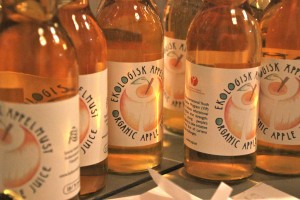
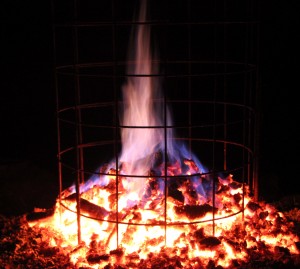
All proceeds from both YIP’s Ljusfesten Café as well as the Äppelmust sold to Järna Kafé will go toward funding the participants International Internships in the spring of 2015.
 Interview With an OT:
Interview With an OT:
Name: Annie Meijer
Where do you call Home?
At the moment, home is wherever my family and I can create a warm daily life together – preferably with an open fire place. Geographically, parts of me feel at home in England, Germany, Switzerland and Sweden respectively.
What do you find inspiring about being a YIP OT?
Being allowed to witness and partake in the development path of another human being in such an immediate way- the ways, gifts, capacities, abilities to endure, and the utter uniqueness of individuals inspire a sense of wonder for what it is to be human.
Where do you see the value of Biographical Counseling at YIP?
The question, to what extent is YIP an inner development program and to what extent is it an outer initiative program, has always been a vital one for those closely connected to the running of YIP. I hope and believe that Biographical Counseling provides one of the bridges between the two. In order to seek out and work towards our task in life and our service in the world, we need the opportunity to work with our own biography, find meaning in our lives and walk into our futures with renewed resolve.
Given a month off, with no limitations, what would you do?
Asking me this in the middle of the darkest time in Sweden may not produce the most inspired answer! I think I would go to Greece and follow the trails and heritage of the Greek Gods- and swim in that wonderful blue, above and below, which I have only encountered there.
Looking Forward:
As the winter break quickly approaches, many of us cannot withhold our excitement for a change of scenery or for the beautiful ambiance that is created at this time of year here in Ytterjärna. But before we all venture out to our varied destinations, or cozy in for two weeks of calm, there are two more weeks of stimulating contributions!
On Monday, the 8th of December, we will be welcoming the first-time contributor, Christopher Marcus, who will be guiding us through “an experimental workshop investigating how some of the world’s main religions impact us and how this can create war or peace.” His course entitled, Are You Your Own Religion?. After that we will dive into a week with Aerin Dunford and Sergio Arruti, joining us all the way from New Mexico in the United States and “exploring how people all over the world are walking out of unsolvable problems and destructive individualism and walking on to solve problems and discover abundant resources.” Their course entitled, Walk Out Walk On.
After the winter break and encouraged by the darkness, opportunities for some inner exploration will be hosted by Orland Bishop, Slava Theater, Marcel de Leuw and others, as we venture forth into 2015 and the remainder of YIP7.
Applications for YIP8 2015-2016!
Be forewarned, YIP8 is a Go! Applications will open soon!
Please pass this news on to anyone who you think should hear it!
The Newsletter:
The Newsletter is a monthly mailing update on the life and times of YIP and is a wonderful way to remain connected. It is sent out once a month and gives an overview of what has happened, what is happening and what is on the horizon. Every quarter (3 months) we plan to put out a more in-depth issue that looks into the Organization of YIP from a similar lense.
Please spread the good word of YIP by forwarding to friends and family and inviting them to sign up!
If you have any questions or concerns regarding the newsletter or feel that there is something you would wish to see more of, contact [email protected]
Enjoy reading!
